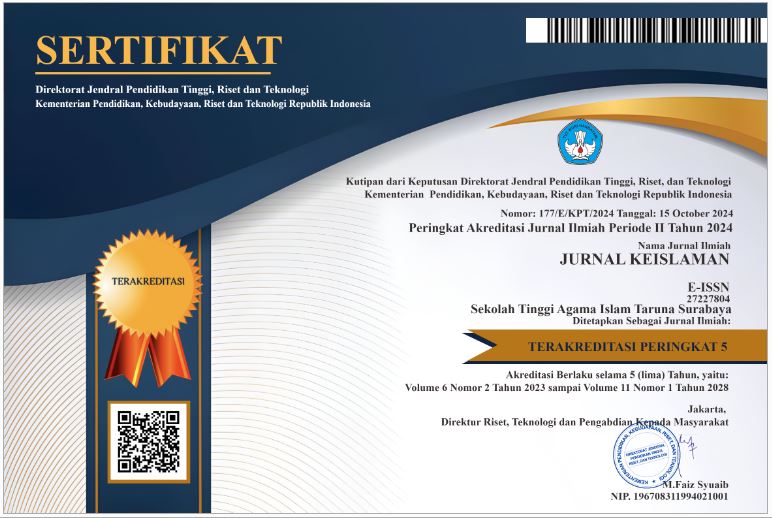Kriteria Pemimpin Perspektif Imam Al-Ghazali Dalam Kitab Ihya’ Ulumuddin
DOI:
https://doi.org/10.54298/jk.v7i1.251Keywords:
leadership criteria, Imam Al-Ghazali's perspective, Ihya' Ulumuddin bookAbstract
This article was prepared with the aim of examining the criteria for leadership, Imam Al-Ghazali's perspective in the book Ihya' Ulumuddin developed rapidly among pious Salafus. With a deeper understanding of the thinking of the leader, Abu Ḥamid Muḥammad ibn Muḥammad ibn Muḥammad Al-Ghazali Al-Safi'i , also known as Al-Ghazali, an Islamic hujjah (1058–1111 AD), highlighted the substantive component of the usefulness of religious teaching rather than the formal symbolic aspect, bringing together elements that had been separated from the figure of the leader; Leaders must be elected by the people. Imam Al-Ghazali defines an ideal leader as a leader who upholds morality, science and religion. they must also be able to influence the environment in which they operate, heal and prevent destruction in their country or organization, and create a just and prosperous society. The method used is library research, and data analysis using a symbolic interaction approach. It is hoped that the results of this research can explain Imam Al-Ghazali's views regarding leaders in the book Ihya' Ulumuddin.
Downloads
References
Adz-Dzakiey, Hamdani Bakran. Kepemimpinan Kenabian "Cara Menjadi Pemimpin dengan Keberkahan Allah, Syafaat Rasuullah, Restu Penghuni Langit dan Bumi. Yogyakarta: al-Manar, 2009.
Ahmad, Zainal Abidin. Konsepsi Negara Bermoral Menurut Imam al-Ghazali. Jakarta: Bulan Bintang, 1975.
Alfandi, Safuan. Ihya’ Ulumuddin Imam Al-Ghazali Filsafat Ilmu dan Kesucian Hati di Bidang Insan dan Lisan. Solo: Sendang Ilmu, 2019.
al-Ghazali. At-Tibr al-Masbuk fi Nasihati al-Mulk. Beirut: lebanon: Darul Kitab Alamiyah, 1409.
———. Ihya’ Ulumuddin. Vol. I. Semarang: Toha Putra, t.t.
———. Ihya’ Ulumuddin. Vol. III. Semarang: Toha Putra, t.t.
———. Ihya’ Ulumuddin. Vol. II. Semarang: Toha Putra, t.t.
———. Keajaiban Hati. Diterjemahkan oleh Nurchikmah. Jakarta: Tintamas Indonesia, 1984.
Aman, Abu, Achmad As’ad Abd. Aziz, dan Atiyatus Syarifah. “Figur Kiai di Madura Perspektif Teori Pemikiran Kekuasaan (Politik) Al-Ghazali.” Nuansa:Jurnal Pnelitian Ilmu Sosial dan Keagamaan Islam 20, no. 2 (2023).
Baihaqi. Sunan al-Baihaqi al-Qubra. Vol. I, t.t.
Balack, Antony. Pemikira Politik Islam: dari Masa Nabi Hingga Masa Kini. Diterjemahkan oleh Abdullah Ali dan Mariana Ariestyawati. Jakarta: Serambi, 2006.
Ghazali, Abu Hamid al-. Al-Iqtishad fi al-I’tiqad. Beirut: Dar al-Qutaibah, 2003.
Hakim, Masykur. “Konsep Kepemimpinan Menurut al-Ghazali.” Ilmu Ushuluddin 5, no. 1 (2018).
Hanafi, Ahmad. Pengantar Filsafat Islam. Jakarta: Bulan Bintang, 1990.
Ismail, Ilyas. True Islam: Moral, Intelektual, Spiritual. Jakarta: Wacana Media, 2013.
Jahja, Zurkani. Teologi al-Ghazali: Pendekatn Metodologi. Yogyakarta: Pustaka Pelajar, 2009.
Jurdi, Syaifuddin. Pemikiran Politik Islam Indonesia. Yogyakarta: Pustaka Pelajar, 2008.
Kartono, Kartini. Pemimpin dan Kepemimpinan, 1990.
M. Padhil, Ramlan Padang, dan Zulkarnaen Gurchi. “Pemikiran Imam Al-Ghazali dalam Kepemimpinan Pendidikan.” Jurna Taushiah FAI UISU 12, no. 2 (2022).
Musthofa. Akhlak Tasawuf. Bandung: Pustaka Setia, 1997.
Pramasto, Arafah. “Pengaruh Sosial-Politik da Intelektual dalam Pembentukan Neo-Sufisme Imam Al-Ghazali.” Al-Mabsut: Jurnal Studi Islam dan Sosial 13, no. 2 (2019).
Purwanto. Amar Ma’ruf Nahi Munkar Imam Al-Ghazali. Bandung: Marjan, 2019.
Rambe, Toguan, dan Seva Mayasari. “Pemikiran Politik Sunni lat Legitimasi Kekusaan.” Jurnal Penelitian Medan Agama 11, no. 1 (2020).
Sahri. “Political thought of Al-Ghazali on Imamah: Debate between theocracy and democracy.” HTS Theological Studies 77, no. 3 (t.t.): 2021.
Shihab, M. Quraish. Wawasan al-Qur’an Tafsir Maudhu’i atas Berbagai Persoalan Umat. Bandung: Mizan, 1996.
Sntani, Lelo. Dasar Kepemimpinan. Tangerang: Yayasan Cendekia Mulia Mandiri, 2022.
Sudarmanto. Agama dan Politik Anti Kekerasan. Yogyakarta: Kanisius, 1989.
Tobroni. The Spiritual Leadership Pengefektifan Organisasi Nobel Industry Melalui Prinsip-Prinsip Spitiyual Etis. Malang: UMM Press, 2010.
Usman, Muhammad Ahsan bin. Mengasingkan Diri (Uzlah) dan Amar Ma’ruf Nahi Munkar Seri Ringkasan Ihya’ Ulumuddin Abu Hamid Muhammad bin Muhammad Al-Ghazali. Yogyakarta: Hikam Pustaka, 2021.
Wathan, Najamul. “Kriteria Kepemimpinan Pendidikan Islam Menurut Al-Ghazali.” Islam Universalia: Internasional Journal of Islamic Studies and Social Sciences 1, no. 1 (2019).
Downloads
Published
How to Cite
Issue
Section
License
Copyright (c) 2024 Nurma Isfira Maharani, Ahmad Muzakki, Saiful Islam

This work is licensed under a Creative Commons Attribution-ShareAlike 4.0 International License.
Authors who publish with this journal agree to the following terms:
- Authors retain copyright and grant the journal right of first publication with the work simultaneously licensed under a Creative Commons Attribution-ShareAlike 4.0 that allows others to share the work with an acknowledgement of the work's authorship and initial publication in this journal.
- Authors are able to enter into separate, additional contractual arrangements for the non-exclusive distribution of the journal's published version of the work (e.g., post it to an institutional repository or publish it in a book), with an acknowledgement of its initial publication in this journal.
- Authors are permitted and encouraged to post their work online (e.g., in institutional repositories or on their website) prior to and during the submission process, as it can lead to productive exchanges, as well as earlier and greater citation of published work (See The Effect of Open Access).


















